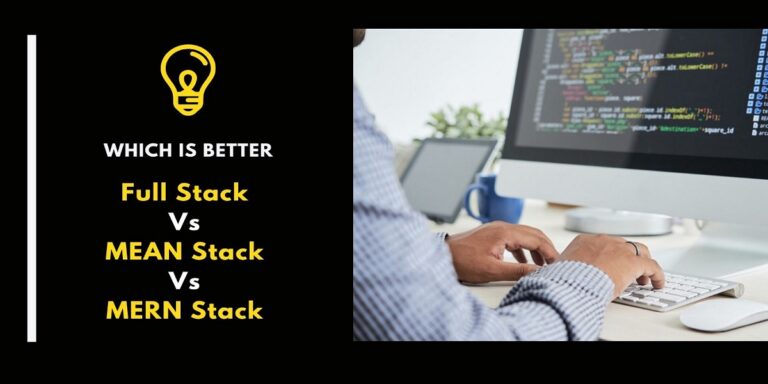Full-Stack vs Mean vs MERN – Which Development Stack Should You Choose? Full-stack developers are front-end and back-end software engineers that know how to build websites, mobile apps, and desktop applications using all three layers of the programming stack—the client-side (Front-End), the business logic (Middle), and the database (Back-End). They can work with anything from HTML and CSS to PHP, Ruby on Rails, Python, JavaScript, and Java.
Which Development Stack Should You Choose
1) What is Full Stack Development?
Full-stack development refers to a single software developer that has knowledge of all parts of a software application. Full-stack development is a term often used to differentiate from half-stack or angular stack development, where each individual specializes in one specific section.
In full-stack development, you have someone who understands every part of how your application works, as well as how it should work and what its purpose is.
A full-stack developer also knows about all types of applications that can interact with yours, making them crucial for any software company looking to maximize profit potential.
With so many moving parts in modern technology and so many variables when it comes to user experience, hiring a full-stack developer will make sure everything is seamless.
2) What is MEAN Stack?
MEAN is a development stack composed of MongoDB, ExpressJS, AngularJS, and Node.js. The MEAN acronym stands for MongoDB, ExpressJS, AngularJS, and Node.js. Together these technologies can be used to build scalable, robust web applications as well as cross-platform mobile apps using a single code base (using Ionic Framework).
These are primarily web-based applications because of their flexibility to use different kinds of databases for data storage purposes and interact with server-side scripting languages such as JavaScript or Python.
This makes it possible to achieve higher performance and scalability while reducing development costs significantly. Therefore, the MEAN stack has gained popularity among most developers due to its advantages over other frameworks in terms of cost efficiency and ease of use.
For many companies or startups, considering switching from LAMP or similar stacks proves beneficial as it requires lesser time in developing websites when compared to other frameworks due to it being flexible enough for automating core application components like user authentication, account management and payment processing features.
Using a single programming language reduces the cost considerably as hiring mean stack developer is always more expensive than writing codes by oneself.
3) What is MERN Stack?
As technology continues to rapidly advance, so does our job market. New roles and skillsets emerge as demand for new ways of doing things increases.
If you’re trying to learn what MEAN or MERN is, you’re in luck! MEAN (MongoDB, ExpressJS, AngularJS, Node.js) and MERN (MongoDB, ExpressJS, React/Redux, Node.js) are both full-stack development frameworks that help developers build applications faster than with just one language or framework alone.
However, they also have some similarities and differences. What do they mean? Well, which should you choose? That’s what we’ll dive into today! It can be hard to get a solid grasp on how each differs from each others.
It isn’t quite comparing apples to oranges, but more like apples to pineapple—comparisons become difficult because each brings its own unique qualities to any project.
4) Why Choose Each Development Stack?
Full-stack refers to a development process in which both front-end and back-end code is written for a website. With full-stack development, one person or team is responsible for developing both front-end (client-side) and back-end (server-side) components.
In addition to HTML, CSS, JavaScript, API’s and databases, full-stack developers use frameworks like ReactJS on projects built with AngularJS or Node.js.
A MEAN stack is basically used to deliver an effective web application using MongoDB as a database server which uses AngularJS as a front-end framework along with Express JS as a server framework.
Read more: Online Calculator


0 Comments